初二八年级英语教案-新目标八年级英语下册unit1-5复习
英语人教版新目标八年级下册知识整理Unit5

【英语】八年级下册教材全梳理(Unit5 If you go to the party you’ll have a great time)知识·巧学生词巧解【词析】音析:字母组合ea读作[]。
义析:a kind of trousers【典句】This pair of jeans is in style.这条牛仔裤很时髦。
【拓展】jeans本身是复数名词,作主语时谓语动词要用复数形式。
take away拿走【词析】形析:take(拿)+away(离开)义析:take sth.from one place to another【典句】Don’t forget to take away your umbrella.别忘了带走你的雨伞。
【拓展】away是副词,当宾语为代词宾格时,一定要放在away的前面。
make a living 谋生【词析】形析:make(做)+a(一种)+living(生活)义析:do sth.for a living【典句】He makes a living as a writer.他靠写作维持生计。
【拓展】使用时,如果说明谋生的手段应在living后加介词by+doing的结构,指“以……为生”。
如:He makes a living by selling books.他以卖书为生。
【词析】音析:a读[],ai读作[e],重音在第二个音节上。
形析:again(又;再次)+st义析:in a direction or course opposite to【典句】We boated against the wind.我们逆风行船。
【拓展】against本身是介词,不能单独作谓语,常和系动词be连用,意为“反对”。
【词析】音析:ch读作[],an读作[],词尾的e不发音。
形析:形近词change(选择)义析:something that happen unusually and luckily【典句】I haven’t had a chance to read my letter.我还没有机会看我的信呢。
人教版八年级英语下册1-5单元复习教案
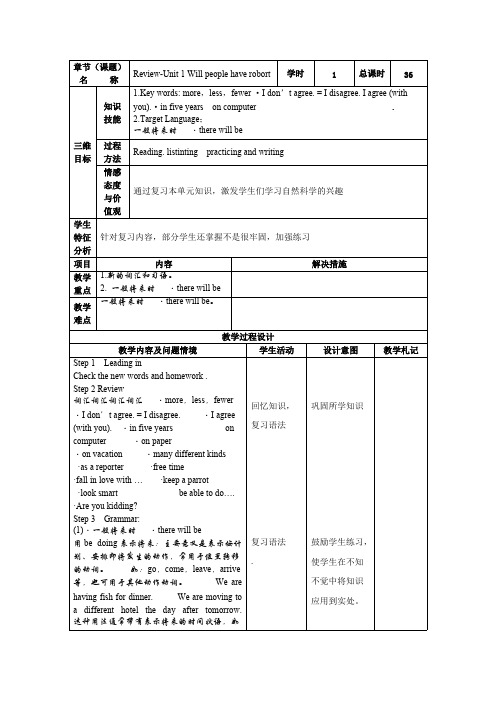
章节(课题)名 称Review-Unit 1 Will people have robort学时1总课时36知识技能1.Key words: more ,less ,fewer ·I don ’t agree. = I disagree. I agree (withyou).·in five years on computer.2.Target Language ;一般将来时 ·there will be过程方法Reading. listinting practicing and writing三维目标情感态度与价值观通过复习本单元知识,激发学生们学习自然科学的兴趣学生特征分析针对复习内容,部分学生还掌握不是很牢固,加强练习项目内容解决措施教学重点1.新的词汇和习语。
2. 一般将来时 ·there will be教学难点一般将来时 ·there will be 。
教学过程设计教学内容及问题情境学生活动设计意图教学札记Step 1 Leading inCheck the new words and homework .Step 2 Review词汇词汇词汇词汇 ·more ,less ,fewer·I don ’t agree. = I disagree. ·I agree(with you). ·in five years oncomputer ·on paper·on vacation ·many different kinds ·as a reporter ·free time·fall in love with … ·keep a parrot ·look smart be able to do…. ·Are you kidding?Step 3 Grammar:(1)·一般将来时 ·there will be用be doing 表示将来:主要意义是表示按计划、安排即将发生的动作,常用于位置转移的动词。
(word完整版)人教版八年级英语下册1-5单元复习教案
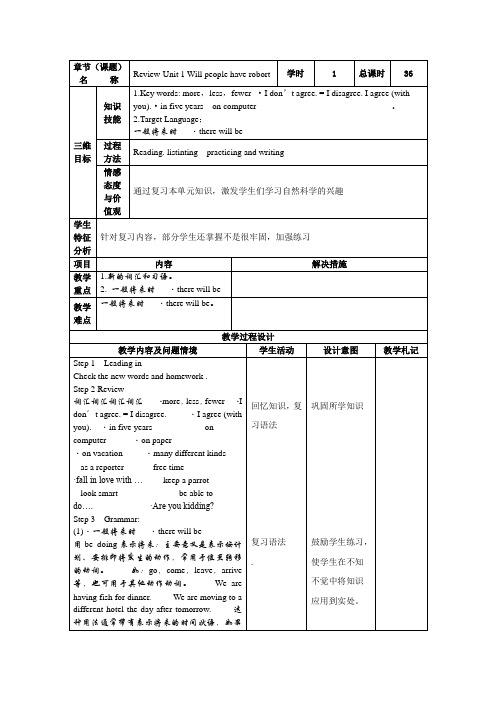
情感态度与价值观
通过复习本单元知识,激发学生们学习自然科学的兴趣
学生特征分析
针对复习内容,部分学生还掌握不是很牢固,加强练习
项目
内容
解决措施
教学重点
1.新的词汇和习语。
2.一般将来时·there will be
教学难点
一般将来时·there will be。
·on vacation·many different kinds
板书设计
Review-Unit 1 Will people have robort
1.Key words:.2.Target Language;一般将来时·there will be。
教学反思
章节(课题)名 称
Review-Unit 1 Will people have robort
学时
1
总课时
36
·on vacation·many different kinds
·as a reporter·free time
·fall in love with …·keep a parrot
·look smart be able to do…. ·Are you kidding?
Step 3Grammar:
章节(课题)名 称
Review-Unit 1 Will people have robort
学时
1
总课时
36
三维目标
知识
技能
1.Key words:more,less,fewer·I don’t agree. = I disagree.I agree (with you).·in five yearson computer.
人教新目标英语八年级下册第一单元教案
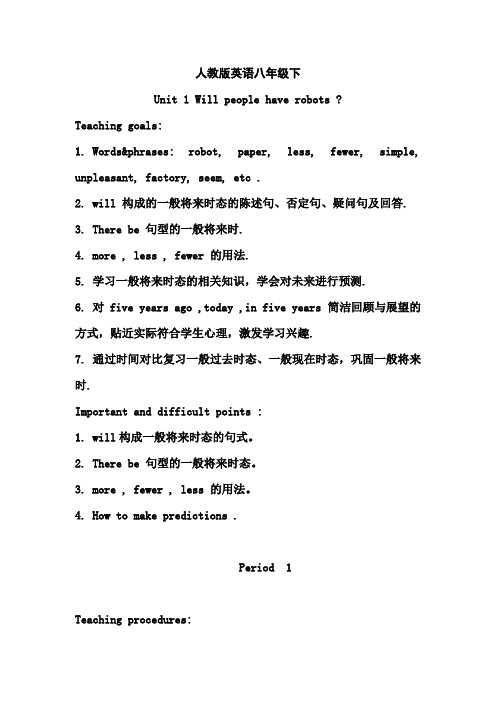
人教版英语八年级下Unit 1 Will people have robots ?Teaching goals:1. Words&phrases: robot, paper, less, fewer, simple, unpleasant, factory, seem, etc .2. will 构成的一般将来时态的陈述句、否定句、疑问句及回答.3. There be 句型的一般将来时.4. more , less , fewer 的用法.5. 学习一般将来时态的相关知识,学会对未来进行预测.6. 对five years ago ,today ,in five years 简洁回顾与展望的方式,贴近实际符合学生心理,激发学习兴趣.7. 通过时间对比复习一般过去时态、一般现在时态,巩固一般将来时.Important and difficult points :1. will构成一般将来时态的句式。
2. There be 句型的一般将来时态。
3. more , fewer , less 的用法。
4. How to make predictions .Period 1Teaching procedures:Step 1 Leading in1. Greetings: Welcome to school .What’s the date today ? Who’s on duty today ?Do you enjoy your winter holiday ?Do you finish your homework ?Do you want to live on the moon ?Can you guess what will happen in ten years ?Collect the Ss’ answers and say something about their predictions .Step 2 Pre-taskSB Page 2 ,1a .1. Look at the picture :How will the world be different in the future ,100 years from now ?We’re going to talk about sth in 100 years .2. Read each predictions to the class .Explain the new vocabulary .3. Read the instructions .Make sure Ss know what they should do .4. Do it by themselves .5. Talk about the answers with the class .Explain :一般将来时态构成: will / be going to +动词原形There be 句型的将来时态形式 There will be more cars in the futrue•everything ,something,为不定代词,如果在句中做主语,则谓语动词要用单数•修饰形容词则放在形容词前。
最新版本新目标英语八年级下册Unit_1-unit5期中复习重点短语和句子
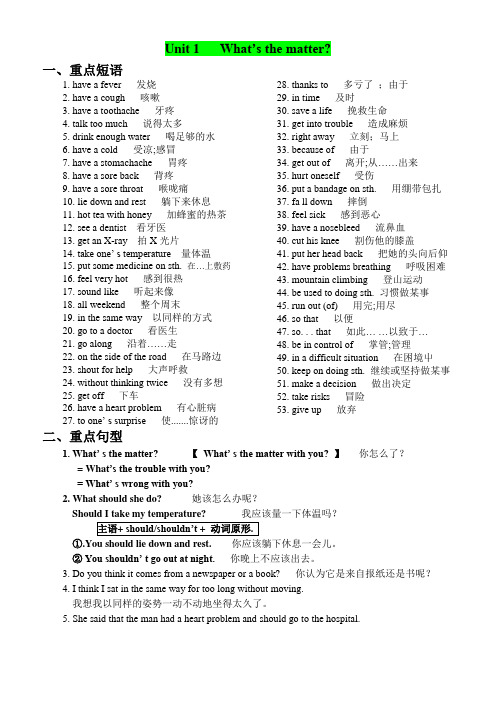
Unit 1 What’s the matter?一、重点短语1. have a fever 发烧2. have a cough 咳嗽3. have a toothache 牙疼4. talk too much 说得太多5. drink enough water 喝足够的水6. have a cold 受凉;感冒7. have a stomachache 胃疼8. have a sore back 背疼9. have a sore throat 喉咙痛10. lie down and rest 躺下来休息11. hot tea with honey 加蜂蜜的热茶12. see a dentist 看牙医13.get an X-ray 拍X光片14. take one‟ s temperature 量体温15. put some medicine on sth. 在…上敷药16. feel very hot 感到很热17. sound like 听起来像18. all weekend 整个周末19. in the same way 以同样的方式20. go to a doctor 看医生21. go along 沿着……走22. on the side of the road 在马路边23. shout for help 大声呼救24. without thinking twice 没有多想25. get off 下车26. have a heart problem 有心脏病27. to one‟ s surprise使.......惊讶的28. thanks to 多亏了;由于29. in time 及时30. save a life 挽救生命31. get into trouble 造成麻烦32. right away 立刻;马上33. because of 由于34. get out of 离开;从……出来35. hurt oneself 受伤36. put a bandage on sth. 用绷带包扎37. fa ll down 摔倒38. feel sick 感到恶心39. have a nosebleed 流鼻血40. cut his knee 割伤他的膝盖41. put her head back 把她的头向后仰42. have problems breathing 呼吸困难43. mountain climbing 登山运动44. be used to doing sth. 习惯做某事45. run out (of) 用完;用尽46. so that 以便47. so. . . that 如此… …以致于…48. be in control of 掌管;管理49. in a difficult situation 在困境屮50. keep on doing sth. 继续或坚持做某事51. make a decision 做出决定52. take risks 冒险53. give up 放弃二、重点句型1. What’ s the matter?【What’ s the matter with you?】你怎么了?= Wha t’s the trouble with you?= What’ s wrong with you?2. What should she do? 她该怎么办呢?Should I take my temperature? 我应该量一下体温吗?①.You should lie down and rest. 你应该躺下休息一会儿。
初二八年级英语教案-新目标八年级英语下册unit1-5复习
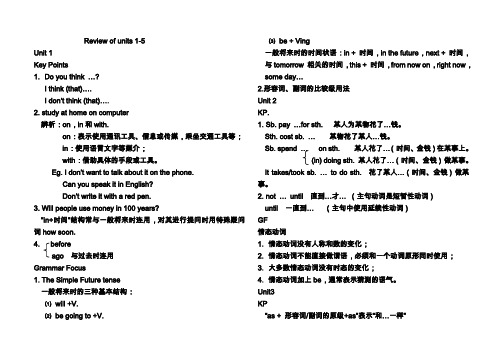
Review of units 1-5Unit 1Key Points1.Do you think …?I think (that)….I don’t think (that)….2. study at home on computer辨析:on,in和with.on:表示使用通讯工具、信息或传媒,乘坐交通工具等;in:使用语言文字等媒介;with:借助具体的手段或工具。
Eg. I don’t want to talk about it on the phone.Can you speak it in English?Don’t write it with a red pen.3. Will people use money in 100 years?“in+时间”结构常与一般将来时连用,对其进行提问时用特殊疑问词how soon.4. beforeago 与过去时连用Grammar Focus1. The Simple Future tense一般将来时的三种基本结构:⑴will +V.⑵be going to +V.⑶be + Ving一般将来时的时间状语:in + 时间,in the future,next + 时间,与tomorrow 相关的时间,this + 时间,from now on,right now,some day…2.形容词、副词的比较级用法Unit 2KP.1. Sb. pay …for sth. 某人为某物花了…钱。
Sth. cost sb. …某物花了某人…钱。
Sb. spend …on sth. 某人花了…(时间、金钱)在某事上。
(in) doing sth. 某人花了…(时间、金钱)做某事。
It takes/took sb. …to do sth. 花了某人…(时间、金钱)做某事。
2. not …until 直到…才…(主句动词是短暂性动词)until 一直到…(主句中使用延续性动词)GF情态动词1.情态动词没有人称和数的变化;2.情态动词不能直接做谓语,必须和一个动词原形同时使用;3.大多数情态动词没有时态的变化;4.情态动词加上be,通常表示猜测的语气。
人教版八年级下册英语 Unit 1-5 复习知识点考点汇编
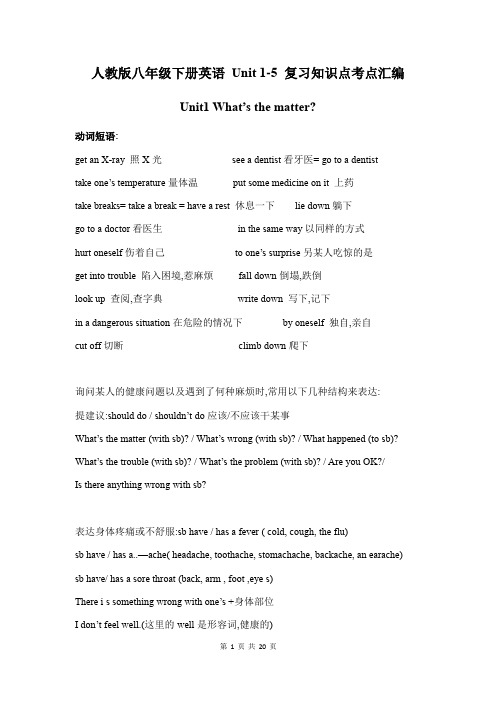
人教版八年级下册英语U nit 1-5 复习知识点考点汇编Unit1 What’s the matter?动词短语:get an X-ray 照X光see a dentist看牙医= go to a dentist take one’s temperature量体温put some medicine on it 上药take breaks= take a break = have a rest 休息一下lie down躺下go to a doctor看医生in the same way以同样的方式hurt oneself伤着自己to one’s surprise另某人吃惊的是get into trouble 陷入困境,惹麻烦fall down倒塌,跌倒look up 查阅,查字典write down 写下,记下in a dangerous situation在危险的情况下by oneself 独自,亲自cut off切断climb down爬下询问某人的健康问题以及遇到了何种麻烦时,常用以下几种结构来表达:提建议:should do / shouldn’t do应该/不应该干某事What’s the matter (with sb)? / What’s wrong (with sb)? / What happened (to sb)? What’s the trouble (with sb)? / What’s the problem (with sb)? / Are you OK?/Is there anything wrong with sb?表达身体疼痛或不舒服:sb have / has a fever ( cold, cough, the flu)sb have / has a..—ache( headache, toothache, stomachache, backache, an earache) sb have/ has a sore throat (back, arm , foot ,eye s)There i s something wrong with one’s +身体部位I don’t feel well.(这里的well是形容词,健康的)Let’s +动词原形./ What (How) about doing sth ? / Why not ( Why don’t you ) do? You’d better do / You’d better not do 最好干某事/最好不要干某事too much + 不可数名词:too much homework 动词+too much : talk too muchtoo many+可数名词复数:too many students much too + adj/ adv : much too tiredhot tea with honey 加蜂蜜的热茶(这里的with是后置定语,修饰tea)away from :远离Stay away from fire.远离火A地离B地的具体距离具体的距离+away from : My home is 500 meters away from my school.Far from:A地离B地很远My home is far from my school.(具体多远不知道)lie 动词,躺、位于,过去式lay , 过去分词lain, 现在分词lying动词,说谎,过去式lied, 过去分词lied, 现在分词lying名词,谎言tell a lie = tell lies说谎lay 动词,下蛋,产卵,放置,过去式laid, 过去分词laid, 现在分词layingsee sb doing sth看见某人正在干某事see sb do sth看见某人干某事的全过程shout for help 大声呼救shout at sb对某人大喊大叫shout to sb对某人大声说话without thinking twice毫不犹豫,不假思索get on 上车get off 下车(大型交通工具)get into / get out of (电梯、出租车等小型交通工具)expect sb to do sth期待某人干某事expect sb not to do sth期待某人不要干某事agree to do sth同意干某事thanks to 多亏了,幸亏= because of = with the help ofin time 及时on time 按时,准时right away=right now = at once立即马上think of想起,认为think about 考虑think about doing sth考虑干某事think over 仔细考虑hit sb in / on +身体部位(软的部位用in,硬的部位用on)run it under water用水冲洗put a bandage on it 用绷带包扎Knives are used to cut things.have trouble (in) doing sth = have problems/difficulty (in) doing sth干某事有麻烦/问题/ 困难have trouble with sth= have problems with sth = have difficulty with sth在某方面有困难be / get used to doing sth 习惯于干某事I am used to getting up early.我习惯了早起used to do sth过去常常干某事(暗示现在不干了)I used to get up early. (暗示现在不。
新目标(人教)八年级下册英语单元复习课件 unit 5 复习课件
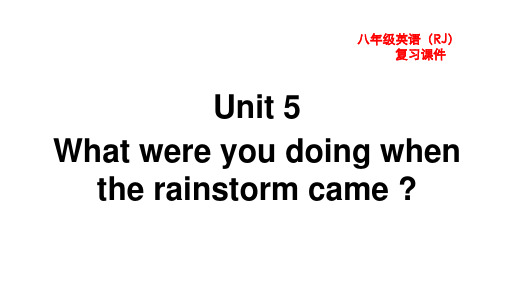
21. 向外看 _b__y_t_h__e__s_id__e of the road
the rest of
look out of
三、核心句型
1.本的爸爸正把一块块木头钉到窗户上,同时他的妈妈在确认手电
筒和收音机都能正常使用。
Ben's dad _w_a__s__ _p_u_t_t_i_n_g_ pieces of wood _o__v_e_r__ the windows _ww_e_h_rie_l_ew_ ohriskimngo.m _w_a__s _m__a_k_i_n_g_ _s_u__re___ the flashlights and radio 2. 暴风雨来的时候你在干什么? What ______ you ________ ________ the rainstorm came?
after that. so scared that
hardly think clearly
6.当校篮球赛开始时,凯特还在去学校的路上。
_W__h__e_n___ the school basketball competition started, Kate ______ still _________ ________ ________ to school. 7.那件事w后as我很难m清a楚ki地ng思考h,er因为我w非a常y 害怕。 I ______ __________ _________ clearly after that because I was very afraid.
【易混辨析】beat与win
beat
意为“打败”,指在游戏或比赛中击败对手,其宾语是比赛或竞 争的对手,如球队、人等。
win
意为“获胜;赢;赢得”,指在竞赛或战争中获得胜利,其宾语 多为表示比赛、战争、奖品、金钱或奖牌等。
- 1、下载文档前请自行甄别文档内容的完整性,平台不提供额外的编辑、内容补充、找答案等附加服务。
- 2、"仅部分预览"的文档,不可在线预览部分如存在完整性等问题,可反馈申请退款(可完整预览的文档不适用该条件!)。
- 3、如文档侵犯您的权益,请联系客服反馈,我们会尽快为您处理(人工客服工作时间:9:00-18:30)。
Review of units 1-5Unit 1Useful Expressions1.make predictions 做预测2.free time 空闲时间3.fly…to…乘坐…飞往…4.on a space station 在太空站上5.I disagree. 我不同意.6.fall/be in love with sb. 与sb.相爱7.keep pets 养宠物8.be able to 能够9.predict the future 预测未来e true 实现11.see sb. do sth. 看见sb.做某事(的全过程)doing sth. 看见sb.正在做某事(片断)12.help sb. with sth. 帮助某人做某事13.hundreds of 数以百计的14.try to do sth. 尽力做某事15.look like 看上去长的像…16.look for 寻找17.一段时间+ from now (从现在起)…之后from now on = in the future 今后Key Points1.Do you think …?I think (that)….I don’t think (that)….2. study at home on computer辨析:on,in和with.on:表示使用通讯工具、信息或传媒,乘坐交通工具等; in:使用语言文字等媒介;with:借助具体的手段或工具。
Eg. I don’t want to talk about it on the phone.Can you speak it in English?Don’t write it with a red pen.3. Will people use money in 100 years?“in+时间”结构常与一般将来时连用,对其进行提问时用特殊疑问词how soon.4. beforeago 与过去时连用Grammar Focus1. The Simple Future tense一般将来时的三种基本结构:⑴will +V.⑵be going to +V.⑶be + Ving一般将来时的时间状语:in + 时间,in the future,next + 时间,与tomorrow 相关的时间,this + 时间,from now on,right now,some day…2.形容词、副词的比较级用法Unit 2UE1. argue with sb. 与某人争吵about/over sth. 为某事争吵2.out of style/danger 过时/脱离险境in style/danger 时尚/处于危险之中3.call up sb. (代词放中间)给某人打电话4.keep out 不让…进入5.What’s wrong? 怎么啦?6.be surprised at …对…感到吃惊7.borrow sth. from sb. 从某人那里借入某物8.need to do sth. (某人)需要做某事doing sth. (某物)需要做某事9.pay … for sth. 为某物付…(钱)10.the same + n. + as…与…一样的n.11.get on well with sb. 与某人相处融洽12.have a fight with sb. 与某人争吵13.take part in 加入14.plan sth. for sb. 为某人计划某事15.as much as possible 尽可能多的…KP.1. Sb. pay …for sth. 某人为某物花了…钱。
Sth. cost sb. …某物花了某人…钱。
Sb. spend …on sth. 某人花了…(时间、金钱)在某事上。
(in) doing sth. 某人花了…(时间、金钱)做某事。
It takes/took sb. … to do sth. 花了某人…(时间、金钱)做某事。
2. not … until 直到…才…(主句动词是短暂性动词)until 一直到…(主句中使用延续性动词)3. leave GF情态动词1.情态动词没有人称和数的变化;2.情态动词不能直接做谓语,必须和一个动词原形同时使用;3.大多数情态动词没有时态的变化;4.情态动词加上be,通常表示猜测的语气。
Unit3UE1.in front of ---- behide 在…的前面---- 在…的后面in the front of ---- at the back of 在…的前部---- 在…的后部(包含在内)2.take off 起飞3.get out of 离开…4.Y ou are kidding. 胡说八道5.follow sb. to do sth. 跟着某人做某事6.get into 进入7.shout at 训斥、责备shout to 向…喊叫8.What happen?发生什么事了?happen = take place 发生9.in silence 沉默地10.in space 在太空中11.at the doctor’s 在诊所12.jump down from…从…跳下13.climb up the tree 爬上树KP“as + 形容词/副词的原级+as”表示“和…一样”否定形式:“not as/so + 形容词/副词的原级+as”表示“和…不一样”GF1.The Past Progressive Tense过去进行时⑴用法:表示在过去某一时刻或某段时间内正在进行的动作。
⑵谓语结构:be ( was, were )+ Ving⑶时间状语:at that time/momentat + 点钟+ yesterday/last nightfrom +点钟+ to +点钟+ yesterdaythis time yesterdayjust thenwhen he came in, ….(when引导的时间状语从句是过去时,并且动词是短暂性动词时,主句使用过去进行时)2.when & whilewhen与while都是从属连词,都有“当……时”的意思。
when 可与一个点的时间或表示一段的时间连用,从句动词可以是短暂性或延续性动词;while 只指一段时间,不能指一点时间。
因此while从句中的谓语动词必须是延续性动词。
UE1.have a surprise party 举办一个惊喜派对2.be mad at/with sb. for sth. 因为某事对某人发火be mad about/on sth./sb. 对某事/某人很着迷3.not … anymore = not … any more = no more 不再4.first of all 首先5.pass ( on ) sth. to sb. 把某物递给某人pass on (代词放中间)6.work on 从事7.be supposed to = should 应该8.be good/better/best at 擅长于…do well/better/best in9.report card 成绩单10.the disappointing result 令人失望的结果11.this semester 本学期12.How’s it going? 你好吗?How goes it?How are things going?13.be in good/poor/bad/ill health 健康状况好/不好/糟糕/病着14.end of year exams 期末考15.get/be nervous of sth./doing sth. 对某事/做某事感到紧张16.have a hard time with sth. 在某事上/做某事处境困难doing sth.17.It’s just that…这只是由于…18.forget to do sth. 忘记去做某事doing sth. 忘记做过某事19.get over 克服20.for now 至今为止21.open up 打开22.care for 照顾1.true 符合客观事实的(人和事)really 真实存在的(人和事)2.be sure that 确信…3.I don’t think (that)…我不认为…(否定前置)GF1.The object clause宾语从句⑴引导词:that ——引导陈述句,在句中可省略;if,whether ——引导一般疑问句,可相互替换(从句中出现or not时只能使用whether);wh-,h- ——引导特殊疑问句。
⑵时态:注意:从句讲述的是客观真理时,不根据主句改变时态。
⑶语序:引导词后加陈述句语序“主句+ 引导词+ 从句主语+ 从句谓语+ 其他”2.Direct Speech and Reported Speech直接引语变为间接引语时参照宾语从句的变法,把双引号内的句子变为宾语从句即可。
以下是另需变化的两点⑷人称和所有格:“一主,二宾,三不变”⑸状语与动词UE1.have a great time 过得很愉快2.wear jeans 穿牛仔裤3.let sb. in/out/by 让某人进来/出去/过去4.be late for 迟到5.be sorry (that)…感到遗憾anize sth. for …为…组织某事7.half (of) the class 半班8.take away…把…拿走、没收bring sth. to …把某物带来…take sth. from …从…把某物带走9.Why not? 为什么不呢?10.clean up 收拾干净11.make a lot of money 挣许多钱12.be famous for…因…而出名be famous as…因作为…而出名13.join = take part in 参加14.a professional athlete 职业运动员15.get injured 受伤16.a great chance 一次好机会17.all the time 一直18.around the world = all over the world 全世界19.make a living (by) doing sth. 做某事谋生plain about sth. 抱怨某事21.decide to do sth. 决定去做某事22.in order to do sth. 以便、为了that + 目的状语从句= so that in order 整齐、有条理、正常23.talk on the phone 讲电话1.too much + 不可数名词too many + 可数名词much too + 形容词2.against 反对、与…相反、与…对抗argue against 抵制GF1.The Conditional Adverbial Clause条件状语从句由if或unless引导,表示如果有从句中的动作发生,就会有主句的动作发生。
